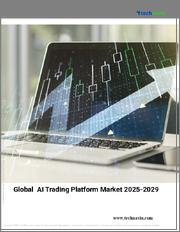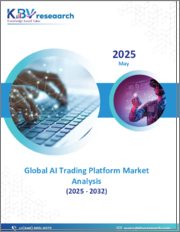
|
시장보고서
상품코드
1859798
기업용 학습 경험 플랫폼 시장 예측(-2032년) : 전개 방식별, 기업 규모별, 기능별, 최종사용자별, 지역별 분석Corporate Learning Experience Platforms Market Forecasts to 2032 - Global Analysis By Deployment Type (Cloud-Based, and On-Premises), Enterprise Size (Large Enterprises, and Small and Medium Enterprises ), Function, End User, and By Geography |
||||||
Stratistics MRC에 따르면 세계의 기업용 기업용 학습 경험 플랫폼(LXP) 시장은 2025년에 27억 달러를 차지하고, 2032년에는 184억 달러에 달하고, 예측 기간 동안 CAGR은 31.2%로 성장할 것으로 예측됩니다.
기업용 학습 경험 플랫폼은 개인화된 학습 여정, 컨텐츠 큐레이션, 소셜 학습, 분석을 중앙 집중화하여 직원 재교육, 사내 유동성, 성과 조정을 가속화합니다. LXP는 AI 추천, 마이크로러닝, 인사 시스템과의 통합을 통해 비즈니스 니즈와 경력 경로에 맞는 역량 개발을 제공합니다. 스킬 기반 채용, 하이브리드 워크모델, 디지털 전환 전략으로 시장 도입이 가속화될 것
Association for Talent Development(ATD)에 따르면, 포춘지 선정 500대 기업의 40% 이상이 직원 교육 개인화, 참여도 지표 추적, 규모에 맞는 기술 개발 촉진을 위해 학습 경험 플랫폼을 도입했다고 보고했습니다.
직원 중심 학습으로의 전환
직원 중심의 학습으로 전환하면서 기업의 LXP 전략은 학습자의 목표와 경력 경로를 우선시하는 개인화된 온디맨드 경험으로 방향을 전환하고 있습니다. 조직은 LXP를 통해 맞춤형 플레이리스트, 스킬 매핑, 컨텍스트에 따른 추천을 제공함으로써 참여도와 유지율을 높이고 있습니다. 또한, 이 접근 방식은 학습을 성과 지표 및 후계자 육성 계획과 연계하여 교육을 측정 가능하고 전략적으로 만들 수 있도록 합니다. 직원들은 모바일 액세스, 한 입 크기의 컨텐츠, 소셜 학습 기능을 기대하고 있으며, 벤더들은 UX 혁신, AI 기반 추천, 인재 관리와의 통합을 통해 기업 내 채택과 확장성을 확대하고 있습니다.
레거시 시스템과의 복잡한 통합
레거시 시스템과의 통합은 복잡하고, 기업은 최신 API와 수십 년 전의 인사, ERP, LMS 인프라를 연결해야 하기 때문에 LXP 도입이 늦어집니다. 많은 경우, 마이그레이션에는 사용자 지정 커넥터, 데이터 매핑, 사용자 기록 및 규정 준수를 유지하기 위한 엄격한 테스트가 필요합니다. 또한, 리소스에 제약이 있는 IT 팀은 우선순위 경쟁에 직면하여 타임라인이 길어지고 비용이 증가하게 됩니다. 벤더가 성공하기 위해서는 강력한 상호운용성, 싱글 사인온, 데이터 변환 도구를 제공해야 합니다. 이러한 마찰은 기존 시스템 교체를 주저하게 만들고, 기능 채택을 제한하며, ROI와 확장성을 지연시키는 단계적 롤아웃으로 이어집니다.
마이크로러닝과 비디오 컨텐츠의 성장
마이크로러닝과 비디오 컨텐츠의 성장은 LXP에게 짧은 시간에 집중된 모듈과 리치 미디어를 통해 수강생들의 참여와 수료율을 높일 수 있는 전략적 기회를 제공합니다. 조직은 적시 교육, 컴플라이언스 재교육, 기술 강화를 위해 모바일 소비와 바쁜 일정에 적합한 스낵형식을 선호하고 있습니다. 또한, 동영상은 체험학습, 시연, 소셜 공유를 가능하게 하여 정착률을 높일 수 있습니다. 손쉬운 저작, 세밀한 분석, 컨텐츠 마켓플레이스를 제공하는 벤더는 자산을 수익화하고 기업 도입을 가속화할 수 있습니다. 컨텐츠 제작자와의 파트너십과 현지화 기능을 통해 전체 워크포스에 대한 도달 범위를 더욱 넓힐 수 있습니다.
LMS 벤더와의 경쟁
기존 LMS 공급업체와의 경쟁은 이들 업체가 HR 및 조달 팀과의 기존 관계를 활용하여 체험형 학습 및 개인화된 학습 기능으로 진출할 때 위협이 될 수 있습니다. 기존 LMS 벤더들은 LXP와 같은 기능을 번들로 제공하고, 설치 기반을 활용하고, 통합된 인재 관리 제품군을 제공함으로써 LXP의 전문가 마진을 압박할 수 있습니다. 또한, 구매자는 벤더 수를 줄이고 통합의 복잡성을 줄이기 위해 통합을 우선시하며, 레거시 공급업체를 우대하는 경우가 많습니다.
COVID-19의 영향:
COVID-19 팬데믹으로 인해 조직이 혼란스러운 상황에서 원격 교육 및 스킬업이 필요해지면서 LXP에 대한 수요가 급증했습니다. 분산형 업무로의 긴급한 전환으로 디지털 학습 인프라에 대한 투자가 증가하고, 가상 멘토링과 마이크로러닝이 받아들여지고 있습니다. 초기 도입 초기에는 교육 방법보다 빠른 배포에 중점을 두었지만, 이후 많은 기업들이 거버넌스, 컨텐츠 품질 및 측정에 더 많은 노력을 기울이고 있습니다. 이러한 전환을 통해 하이브리드 학습은 내구성 있는 모델로 자리 잡았고, 성과 코칭 및 분석을 지원하는 플랫폼에 대한 예산이 증가하면서 전 세계적으로 시장 모멘텀이 강화되었습니다.
예측 기간 동안 대기업 부문이 가장 클 것으로 예상됩니다.
대기업 부문은 리스킬, 리더십 개발, 여러 관할권에 걸친 컴플라이언스에 많은 예산을 할당하고 있기 때문에 예측 기간 동안 가장 큰 시장 점유율을 차지할 것으로 예상됩니다. ROI 측정과 HRIS 및 인재 플랫폼과의 통합에 대한 요구가 장기 계약과 프리미엄 기능의 채택을 촉진하고 있습니다. 또한, 중앙 집중식 조달 및 기업 간 계약은 규모에 따른 배포를 간소화하는 반면, 복잡한 학습 요구 사항은 고급 분석, 코칭 및 후계자 육성 도구에 대한 투자를 정당화합니다. 이러한 요인들이 결합되어 시장 가치는 대기업에 집중되어 있으며, LXP 제공업체는 전 세계적으로 예측 가능한 구독 수익을 유지하고 있습니다.
예측 기간 동안 지속적인 성과 지원 및 코칭 분야는 가장 높은 CAGR을 기록할 것으로 예상됩니다.
예측 기간 동안 기업들이 생산성 및 기술 채용의 측정 가능한 개선을 추구함에 따라, 지속적인 성과 지원 코칭 분야가 가장 높은 성장률을 보일 것으로 예상됩니다. 내장된 가이드, 적시 리소스, 코칭 분석, 성과 격차를 줄이고, 원격 근무자 및 하이브리드 근무자를 지원하는 코칭 분석이 내장되어 있습니다. 마이크로 평가, 피드백 루프, 관리자 대시보드를 통합한 벤더는 증거에 기반한 육성 계획을 수립할 수 있습니다. 또한, 구독 모델과 모듈식 애드온은 중견기업의 진입장벽을 낮춰줍니다. 이처럼 컨텐츠의 양보다 성과에 초점을 맞춘 실질적인 노력으로 도입이 가속화되고, 이 부문의 성장률이 가장 높을 것으로 예상됩니다.
가장 큰 점유율을 차지하는 지역:
예측 기간 동안 북미는 성숙한 디지털 인프라, 높은 기업 학습 예산, 클라우드 기반 플랫폼의 광범위한 채택으로 인해 가장 큰 시장 점유율을 차지할 것으로 예상됩니다. 벤더, 컨설턴트, 통합업체로 구성된 탄탄한 생태계가 복잡한 기업 구축을 지원하는 한편, 규제 압력과 컴플라이언스 요건이 추적 가능한 학습 솔루션에 대한 수요를 촉진하고 있습니다. 또한, 원격 근무와 하이브리드 근무 모델이 확산되면서 확장 가능한 코칭과 분석 기능이 요구되고 있습니다. 이러한 요인들은 초기 기술 도입과 벤처기업의 혁신과 함께 이 지역의 시장에서의 우위를 뒷받침하고 있습니다.
CAGR이 가장 높은 지역:
예측 기간 동안 아시아태평양은 급속한 디지털화, 인터넷 및 스마트폰 보급 확대, 인재 육성에 대한 투자 증가로 인해 가장 높은 CAGR을 보일 것으로 예상됩니다. 중산층의 증가와 기술 격차로 인해 기업들은 기술 재교육과 리더십 파이프라인을 위해 확장 가능한 LXP를 도입해야 할 필요성이 대두되고 있습니다. 현지 업체들은 언어 현지화, 저대역폭 컨텐츠, 저렴한 구독 모델로 혁신을 추진하고 있으며, 다국적 업체들은 파트너십을 통해 새로운 시장에 진입하기 위해 노력하고 있습니다. 디지털 교육 및 기업의 기술력 향상을 지원하는 정부 이니셔티브는 도입에 더욱 박차를 가하고 있으며, 국가마다 도입률은 다르지만 빠르게 성장하고 있습니다.
무료 커스터마이징 서비스:
본 보고서를 구독하는 고객은 다음과 같은 무료 맞춤화 옵션 중 하나를 이용할 수 있습니다:
- 기업 소개
- 추가 시장 기업의 종합적인 프로파일링(최대 3개사까지)
- 주요 기업 SWOT 분석(3개사까지)
- 지역 세분화
- 고객의 관심에 따른 주요 국가별 시장 추정, 예측, CAGR(주: 타당성 검토에 따른)
- 경쟁사 벤치마킹
- 제품 포트폴리오, 지리적 입지, 전략적 제휴를 기반으로 한 주요 기업 벤치마킹
목차
제1장 주요 요약
제2장 서론
- 개요
- 이해관계자
- 분석 범위
- 분석 방법
- 데이터 마이닝
- 데이터 분석
- 데이터 검증
- 분석 접근법
- 분석 자료
- 1차 조사 자료
- 2차 조사 자료
- 가정
제3장 시장 동향 분석
- 성장 촉진요인
- 성장 억제요인
- 시장 기회
- 위협
- 최종사용자 분석
- 신흥 시장
- 신종 코로나바이러스 감염증(COVID-19)의 영향
제4장 Porter's Five Forces 분석
- 공급업체의 협상력
- 구매자의 협상력
- 대체 제품의 위협
- 신규 진출 기업의 위협
- 기업간 경쟁
제5장 세계의 기업용 학습 경험 플랫폼(LXP) 시장 : 전개 방식별
- 클라우드 기반(SaaS)
- 온프레미스
제6장 세계의 기업용 학습 경험 플랫폼(LXP) 시장 : 기업 규모별
- 대기업
- 중소기업
제7장 세계의 기업용 학습 경험 플랫폼(LXP) 시장 : 기능별
- 공식 학습
- 비공식 학습
- 지속적인 퍼포먼스 서포트·코칭
제8장 세계의 기업용 학습 경험 플랫폼(LXP) 시장 : 최종사용자별
- BFSI(은행·금융 서비스·보험)
- IT·통신
- 헬스케어·의약품
- 제조업
- 소매업·E-Commerce
- 기타 최종사용자
제9장 세계의 기업용 학습 경험 플랫폼(LXP) 시장 : 지역별
- 북미
- 미국
- 캐나다
- 멕시코
- 유럽
- 독일
- 영국
- 이탈리아
- 프랑스
- 스페인
- 기타 유럽
- 아시아태평양
- 일본
- 중국
- 인도
- 호주
- 뉴질랜드
- 한국
- 기타 아시아태평양
- 남미
- 아르헨티나
- 브라질
- 칠레
- 기타 남미
- 중동 및 아프리카
- 사우디아라비아
- 아랍에미리트
- 카타르
- 남아프리카공화국
- 기타 중동 및 아프리카
제10장 주요 동향
- 계약, 사업 제휴·협력, 합작투자
- 기업 인수합병(M&A)
- 신제품 발매
- 사업 확장
- 기타 주요 전략
제11장 기업 개요
- Degreed
- Docebo
- Cornerstone OnDemand
- LinkedIn Corporation
- Skillsoft
- Pluralsight
- Coursera
- Udemy
- 360Learning
- Learn Amp
- Fuse Universal
- Valamis
- Thought Industries
- BenchPrep
- Totara
- Workday
According to Stratistics MRC, the Global Corporate Learning Experience Platforms (LXP) Market is accounted for $2.7 billion in 2025 and is expected to reach $18.4 billion by 2032, growing at a CAGR of 31.2% during the forecast period. Corporate Learning Experience Platforms centralize personalized learning journeys, content curation, social learning, and analytics to accelerate employee reskilling, internal mobility, and performance alignment. LXPs use AI recommendations, microlearning, and integrations with HR systems to tailor development to business needs and career paths. Market adoption rises with skills-based hiring, hybrid work models, and digital transformation strategies.
According to the Association for Talent Development (ATD), over 40% of Fortune 500 companies report implementation of learning experience platforms to personalize employee training, track engagement metrics, and foster skills development at scale.
Market Dynamics:
Driver:
Shift to Employee-Centric Learning
Shift to employee-centric learning has reoriented corporate LXP strategies toward personalised, on-demand experiences that prioritise learner goals and career paths. Organisations adopt LXPs to deliver tailored playlists, skills mapping, and contextual recommendations that increase engagement and retention. Furthermore, this approach aligns learning with performance metrics and succession planning, making training measurable and strategic. Employees expect mobile access, bite-sized content, and social learning features, prompting vendors to innovate UX, AI-driven recommendations, and integration with talent management, thereby expanding enterprise adoption and scalability.
Restraint:
Integration Complexity with Legacy Systems
Integration complexity with legacy systems slows LXP deployments as enterprises must bridge modern APIs with decades-old HR, ERP, and LMS infrastructures. Migration often requires custom connectors, data mapping, and rigorous testing to preserve user records and compliance. Additionally, resource-constrained IT teams face competing priorities, elongating timelines and increasing costs. Vendors must offer robust interoperability, single sign-on, and data transformation tools to succeed. This friction discourages some buyers from replacing incumbent systems, leading to phased rollouts that can limit feature adoption and delay ROI and scalability.
Opportunity:
Growth of Microlearning and Video Content
Growth of microlearning and video content presents a strategic opportunity for LXPs to increase learner engagement and completion rates through short, focused modules and rich media. Organisations favour snackable formats for just-in-time training, compliance refreshers, and skill reinforcement, which suit mobile consumption and busy schedules. Moreover, video enables experiential learning, demonstrations, and social sharing, amplifying retention. Vendors that provide easy authoring, granular analytics, and content marketplaces can monetise assets and accelerate enterprise adoption. Partnerships with content creators and localization capabilities further extend reach across workforces.
Threat:
Competition from LMS Vendors
Competition from established LMS vendors poses a threat as these providers expand into experiential and personalised learning features, leveraging existing relationships with HR and procurement teams. LMS incumbents can bundle LXP-like functionality, exploit installed bases, and offer integrated talent management suites, squeezing specialist LXP margins. Additionally, buyers often prioritize consolidation to reduce vendor count and integration complexity, favouring legacy suppliers.
Covid-19 Impact:
The Covid-19 pandemic accelerated demand for LXPs as organisations needed remote training and upskilling during disruptions. Emergency shifts to distributed work increased investment in digital learning infrastructure and acceptance of virtual mentoring and microlearning. While initial implementations emphasised rapid deployment over pedagogy, many enterprises later refined governance, content quality, and measurement. This transition established hybrid learning as a durable model and boosted budgets for platforms that support performance coaching and analytics, strengthening market momentum globally.
The large enterprises segment is expected to be the largest during the forecast period
The large enterprises segment is expected to account for the largest market share during the forecast period because they allocate significant budgets to reskilling, leadership development, and compliance across multiple jurisdictions. Their demand for measurable ROI and integration with HRIS and talent platforms encourages long-term contracts and premium feature adoption. Furthermore, centralised procurement and enterprise agreements simplify deployment at scale, while complex learning requirements justify investments in advanced analytics, coaching, and succession tools. These factors combine to concentrate market value among large corporations and sustain predictable subscription revenues for LXP providers globally.
The continuous performance support and coaching segment is expected to have the highest CAGR during the forecast period
Over the forecast period, the continuous performance support and coaching segment is predicted to witness the highest growth rate as companies seek measurable improvements in productivity and skill adoption. Embedded guidance, just-in-time resources, and coaching analytics reduce performance gaps and support remote or hybrid workers. Vendors that integrate micro assessments, feedback loops, and manager dashboards enable evidence-based development plans. Additionally, subscription models and modular add-ons lower entry barriers for mid-sized firms. This practical focus on performance outcomes, rather than content volume, is expected to accelerate adoption and produce the segment's highest growth rate.
Region with largest share:
During the forecast period, the North America region is expected to hold the largest market share because of mature digital infrastructure, high corporate learning budgets, and widespread adoption of cloud-based platforms. A robust ecosystem of vendors, consultants, and integrators supports complex enterprise deployments, while regulatory pressures and compliance requirements drive demand for trackable learning solutions. Additionally, strong penetration of remote and hybrid work models necessitates scalable coaching and analytics capabilities. These factors, combined with early technology adoption and venture-backed innovation, sustain a dominant regional position in the market.
Region with highest CAGR:
Over the forecast period, the Asia Pacific region is anticipated to exhibit the highest CAGR driven by rapid digitalisation, expanding internet and Smartphone penetration, and rising investment in workforce development. Growing middle-class economies and skill gaps compel organisations to adopt scalable LXPs for re-skilling and leadership pipelines. Local vendors are innovating with language localisation, low-bandwidth content, and affordable subscription models, while multinational providers form partnerships to enter new markets. Government initiatives supporting digital education and corporate up skilling further accelerate adoption, producing steep growth despite heterogeneous adoption rates across countries.
Key players in the market
Some of the key players in Corporate Learning Experience Platforms (LXP) Market include Degreed, Docebo, Cornerstone OnDemand, LinkedIn Corporation, Skillsoft, Pluralsight, Coursera, Udemy, 360Learning, Learn Amp, Fuse Universal, Valamis, Thought Industries, BenchPrep, Totara, and Workday.
Key Developments:
In October 2025, Coursera, Inc. announced its Skills Tracks solution: "Tailored, data-backed learning solution to accelerate critical skills development across functional teams," mapping learning to jobs, skills and content.
In September 2025, Workday, Inc. signed a definitive agreement to acquire Sana Labs (AI-powered learning & knowledge Management Company) to integrate AI-powered learning/knowledge with Workday's core platform, moving toward a "new front door for work".
In April 2025, Docebo Inc. unveiled its "AI-First Learning Platform" at its Docebo Inspire 2025 event, introducing innovations such as AI Creator & AI Video Presenter, AI Virtual Coaching, and a new L&D agentic marketplace ("Harmony") to redefine corporate learning at scale.
Deployment Types Covered:
- Cloud-Based (SaaS)
- On-Premises
Enterprise Sizes Covered:
- Large Enterprises
- Small and Medium Enterprises (SMEs)
Functions Covered:
- Formal Learning
- Informal Learning
- Continuous Performance Support and Coaching
End Users Covered:
- BFSI (Banking, Financial Services, and Insurance)
- IT and Telecom
- Healthcare and Pharmaceuticals
- Manufacturing
- Retail and E-commerce
- Other End Users
Regions Covered:
- North America
- US
- Canada
- Mexico
- Europe
- Germany
- UK
- Italy
- France
- Spain
- Rest of Europe
- Asia Pacific
- Japan
- China
- India
- Australia
- New Zealand
- South Korea
- Rest of Asia Pacific
- South America
- Argentina
- Brazil
- Chile
- Rest of South America
- Middle East & Africa
- Saudi Arabia
- UAE
- Qatar
- South Africa
- Rest of Middle East & Africa
What our report offers:
- Market share assessments for the regional and country-level segments
- Strategic recommendations for the new entrants
- Covers Market data for the years 2024, 2025, 2026, 2028, and 2032
- Market Trends (Drivers, Constraints, Opportunities, Threats, Challenges, Investment Opportunities, and recommendations)
- Strategic recommendations in key business segments based on the market estimations
- Competitive landscaping mapping the key common trends
- Company profiling with detailed strategies, financials, and recent developments
- Supply chain trends mapping the latest technological advancements
Free Customization Offerings:
All the customers of this report will be entitled to receive one of the following free customization options:
- Company Profiling
- Comprehensive profiling of additional market players (up to 3)
- SWOT Analysis of key players (up to 3)
- Regional Segmentation
- Market estimations, Forecasts and CAGR of any prominent country as per the client's interest (Note: Depends on feasibility check)
- Competitive Benchmarking
- Benchmarking of key players based on product portfolio, geographical presence, and strategic alliances
Table of Contents
1 Executive Summary
2 Preface
- 2.1 Abstract
- 2.2 Stake Holders
- 2.3 Research Scope
- 2.4 Research Methodology
- 2.4.1 Data Mining
- 2.4.2 Data Analysis
- 2.4.3 Data Validation
- 2.4.4 Research Approach
- 2.5 Research Sources
- 2.5.1 Primary Research Sources
- 2.5.2 Secondary Research Sources
- 2.5.3 Assumptions
3 Market Trend Analysis
- 3.1 Introduction
- 3.2 Drivers
- 3.3 Restraints
- 3.4 Opportunities
- 3.5 Threats
- 3.6 End User Analysis
- 3.7 Emerging Markets
- 3.8 Impact of Covid-19
4 Porters Five Force Analysis
- 4.1 Bargaining power of suppliers
- 4.2 Bargaining power of buyers
- 4.3 Threat of substitutes
- 4.4 Threat of new entrants
- 4.5 Competitive rivalry
5 Global Corporate Learning Experience Platforms (LXP) Market, By Deployment Type
- 5.1 Introduction
- 5.2 Cloud-Based (SaaS)
- 5.3 On-Premises
6 Global Corporate Learning Experience Platforms (LXP) Market, By Enterprise Size
- 6.1 Introduction
- 6.2 Large Enterprises
- 6.3 Small and Medium Enterprises (SMEs)
7 Global Corporate Learning Experience Platforms (LXP) Market, By Function
- 7.1 Introduction
- 7.2 Formal Learning
- 7.3 Informal Learning
- 7.4 Continuous Performance Support and Coaching
8 Global Corporate Learning Experience Platforms (LXP) Market, By End User
- 8.1 Introduction
- 8.2 BFSI (Banking, Financial Services, and Insurance)
- 8.3 IT and Telecom
- 8.4 Healthcare and Pharmaceuticals
- 8.5 Manufacturing
- 8.6 Retail and E-commerce
- 8.7 Other End Users
9 Global Corporate Learning Experience Platforms (LXP) Market, By Geography
- 9.1 Introduction
- 9.2 North America
- 9.2.1 US
- 9.2.2 Canada
- 9.2.3 Mexico
- 9.3 Europe
- 9.3.1 Germany
- 9.3.2 UK
- 9.3.3 Italy
- 9.3.4 France
- 9.3.5 Spain
- 9.3.6 Rest of Europe
- 9.4 Asia Pacific
- 9.4.1 Japan
- 9.4.2 China
- 9.4.3 India
- 9.4.4 Australia
- 9.4.5 New Zealand
- 9.4.6 South Korea
- 9.4.7 Rest of Asia Pacific
- 9.5 South America
- 9.5.1 Argentina
- 9.5.2 Brazil
- 9.5.3 Chile
- 9.5.4 Rest of South America
- 9.6 Middle East & Africa
- 9.6.1 Saudi Arabia
- 9.6.2 UAE
- 9.6.3 Qatar
- 9.6.4 South Africa
- 9.6.5 Rest of Middle East & Africa
10 Key Developments
- 10.1 Agreements, Partnerships, Collaborations and Joint Ventures
- 10.2 Acquisitions & Mergers
- 10.3 New Product Launch
- 10.4 Expansions
- 10.5 Other Key Strategies
11 Company Profiling
- 11.1 Degreed
- 11.2 Docebo
- 11.3 Cornerstone OnDemand
- 11.4 LinkedIn Corporation
- 11.5 Skillsoft
- 11.6 Pluralsight
- 11.7 Coursera
- 11.8 Udemy
- 11.9 360Learning
- 11.10 Learn Amp
- 11.11 Fuse Universal
- 11.12 Valamis
- 11.13 Thought Industries
- 11.14 BenchPrep
- 11.15 Totara
- 11.16 Workday



















